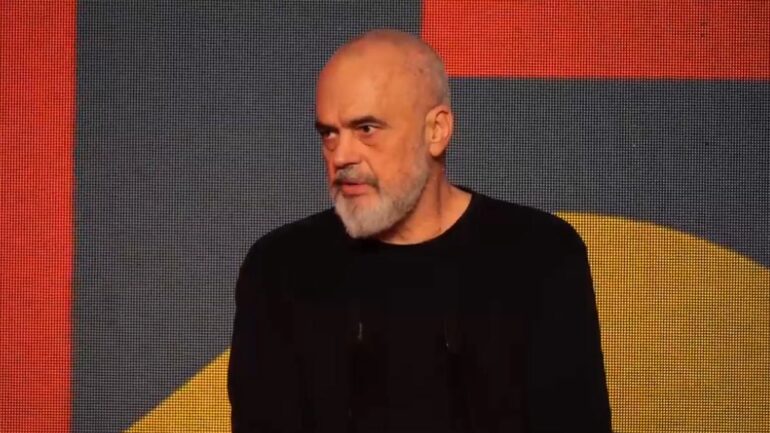We are not a Prosecutorial Republic: on Tirana’s 105th Anniversary, PM Rama denounces SPAK’s handling of mayor’s arrest

In a late evening event celebrating the 105th anniversary of Tirana being declared Albania’s capital, Prime Minister Edi Rama delivered his most forceful criticism yet of SPAK’s prosecution of arrested Mayor Erion Veliaj. The speech, which took place in Veliaj’s absence, outlined serious concerns about procedural violations, selective justice, and political ramifications. It was not the first time that Rama addressed the issue on Tuesday, but it was the clearest and most direct condemnation yet. In his remarks, the prime minister declared that Albania is not a prosecutorial republic, warning that SPAK’s actions threaten the balance of democratic institutions and mark a dangerous precedent.
Why is this Important: Rama’s remarks mark a major turning point in the Socialist Party’s approach to SPAK and the justice reform. For years, his government has championed and defended SPAK, even as most of the high-profile prosecutions and arrests targeted Socialist officials. However, the controversial handling of Veliaj’s case—particularly his imprisonment just three months before elections, while opposition leader Sali Berisha was released from house arrest to campaign—has led Rama to accuse SPAK of exceeding its constitutional powers and jeopardizing democracy.
Context: Rama’s speech firmly positioned the Socialist Party against what he called a “prosecutorial republic”, where unelected prosecutors override democratic mandates and make politically consequential decisions without accountability to the people.
“Only in a republic of prosecutors does a quarter of a million citizens elect a mayor, and then someone I don’t even know by face decides overnight to take him away, without trial, without due process. In this country, we have fought for years so that politics does not interfere with justice. But who exactly do these prosecutors answer to?”
Key arguments from Rama’s speech: The speech signaled a dramatic shift in the Socialist Party’s stance toward SPAK. While Rama reaffirmed his commitment to fighting corruption, he also warned against prosecutors abusing their independence to impose what he called arbitrary and politically charged actions. He laid out a detailed critique of SPAK’s handling of the case, highlighting serious irregularities and violations of legal norms:
Veliaj’s detention is an attack on democracy, not a case of corruption. Rama argued that SPAK has not prosecuted a corruption scheme but instead it built a case against Veliaj as an individual, targeting him personal and his family. He condemned the use of anonymous denunciations as the basis for a criminal investigation:
“There is no concrete charge of corruption here. Instead, there is an investigation into a man’s private life, his family, his household, and his wife’s work, all based on an anonymous letter submitted a year ago. That’s not justice. That’s a novel!”
Selective justice. The prime minister underlined the fact that Berisha was freed to campaign, while Veliaj was jailed just before the elections. He questioned why SPAK treated these two cases so differently, arguing that the judicial system should not be used to influence elections:
“Three months before the elections, the mayor of the capital is taken out of office and put behind bars, while a former prime minister accused of corruption is freed. If that’s not a double standard, I don’t know what is.”
SPAK manipulated public perception with exaggerated luxury spending claims. Rama issued a blistering denunciation of media leaks allegedly from SPAK sources, suggesting Veliaj’s wife had spent 800,000 euros on luxury shopping, dismissing them as a fabricated spectacle:
“Throwing the number 800,000 euros into the public debate without proof is an intentional act meant to create a scandal where none exists. Who benefits from such a circus? It is nothing but a political game disguised as a legal process.
Unjust treatment of Veliaj’s wife. Rama condemned the house arrest measure imposed on Veliaj’s wife, who returned immediately from Italy where she was receiving medical treatment when notified of the house arrest measure. He argued that previous cases had considered family circumstances, but not in this instance:
“She is under house arrest while her husband is in prison. Their six-year-old child now has to rely on the kindness of strangers to take him to school. Where is the humanity in this?”
SPAK’s handling of the Law Commission Chair exposes serious procedural flaws. The prime minister revealed a troubling new detail—the head of the parliamentary Law Commission only learned from television that she was under investigation, without ever having been questioned by SPAK:
“How is it possible that an official finds out from the news that she is under investigation, without ever being questioned by prosecutors? What kind of justice is this? This is not the rule of law. This is the rule of rumors.”
What else: Rama issued his strongest warning yet that SPAK’s overreach is turning Albania into a country where unelected prosecutors hold unchecked power over elected officials and democratic institutions. He cautioned that such a shift is dangerous and unacceptable:
“No one elected these prosecutors. They are accountable to no one. Yet they have the power to remove an elected mayor from office without trial. This is not how democracy functions. This is not a prosecutorial republic!”
What’s next: Rama made it clear that the Socialist Party will no longer remain passive in the face of SPAK’s actions. He insisted that Albania needs a strong and independent judiciary but warned that prosecutors must also be held accountable for their actions.
His declaration that “we are not a prosecutorial republic” was the strongest warning yet that the Socialist Party will adopt a more assertive stance toward SPAK. With elections approaching, the political implications of Veliaj’s arrest are expected to intensify, and the conflict between the Socialist Party and SPAK is likely to escalate.


